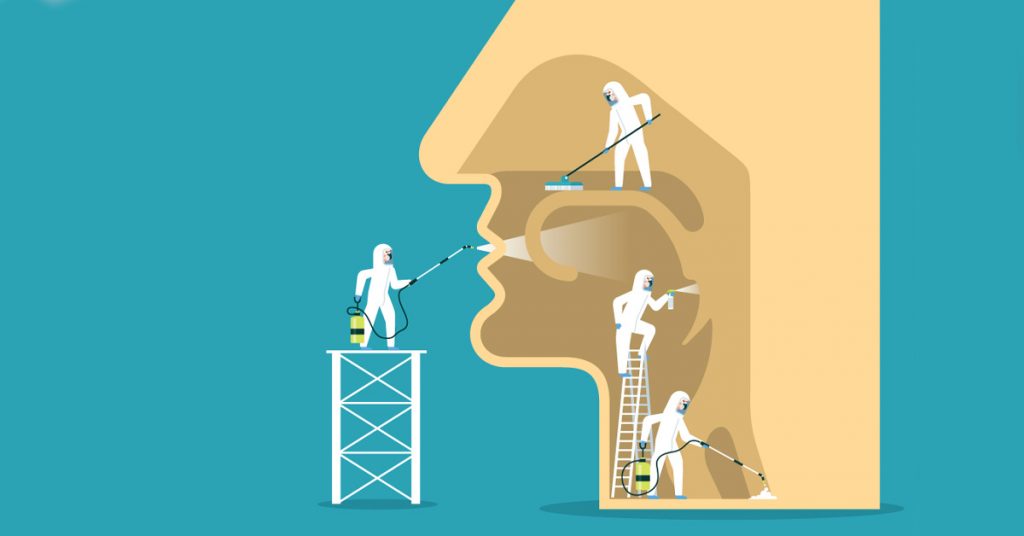People who lead a healthy lifestyle often know how best to keep their body systems working well: exercise benefits the heart, sunscreen protects the skin, adequate sleep reduces stress and more. But unless you have problems with your sinuses or allergies, you may not readily know ways to keep your sinuses healthy. You might not even know exactly what sinuses are.
What are sinuses? Our sinuses are cavities that extend through the forehead and cheekbones, behind the nose and between the eyes. They’re lined with soft tissue and lightly coated with mucus, which keeps the tissue moist and healthy. The cavities are usually empty, and air passes through the sinus passages on the way to the lungs. The mucus helps humidify the air and filters it by trapping bacteria.
To keep healthy, the sinuses need to be able to drain regularly and freely to clear mucus and function correctly. Sinus problems result when the drainage is blocked. Swollen or inflamed sinuses (sinusitis) interfere with normal drainage, which makes mucus build up. Sinusitis can cause congestion, pain and pressure in the sinuses. The common cold is the most common cause of sinusitis, though allergies, bacteria or fungi can also lead to it.
How do you keep sinuses healthy? In the spring, plants release pollen. As you breathe in the tiny particles, they can cause an allergic reaction in your sinuses. So it’s an important time of year to think about how to keep your sinuses healthy.
As with many health conditions, prevention is the best medicine. Here are some tips:
- Rinse the nasal passages: You can use a saline solution to clear the sinuses of pollen, irritants and thick mucus. Look for over-the-counter saline solutions at the drugstore. You can also use a Neti Pot, though keep in mind these recommendations from the FDA.
- Maintain good hygiene: Since sinusitis is often caused by viruses and bacteria, make sure you wash your hands frequently and avoid people who are sick.
- Reduce airborne irritants: You can lower the allergens and irritants that reach your nasal passages. There are a few ways to do that:
Invest in a filter: Adding a HEPA air filter in your bedroom, office or living room can make your home more comfortable. You can also have more than one. Another option is to install air filtration in your house’s HVAC system.
Close doors and windows when the pollen count is high: As the temperatures rise in Minnesota, it’s exciting to get that fresh air in. But be mindful of doing so on days with high pollen count.
Change home air filters regularly: HVAC filters should be changed as directed so they adequately can remove particles from the air circulating in your home. - Keep sinuses moist: There are a few related tips that help keep sinuses healthy.
- Drink water: Staying hydrated is important to a healthy lifestyle in general. With respect to the sinuses, it’s important to keep the mucus in the nasal, sinus and respiratory passages thin and flowing. Thick mucus allows bacteria to grow.
- Use a humidifier: Dry air can cause mucus to thicken, which in turn can clog sinuses. When you increase the moisture in the home’s air, it helps keep your sinus membranes healthy. Your bedroom is the most important room in the house in which to keep a humidifier going. Just be sure to clean it daily or bacteria can grow.
- Inhale steam: Take a few moments in the shower to inhale the warm, moist air to loosen up mucus in your nasal passages. Or put a towel over your head as you breathe in the steam over a bowl of hot water.
- Apply heat: You can open the sinuses by applying a warm washcloth to your face over the affected sinuses. This can help break up and thin out excess mucus, which allows it to drain more effectively. You can get a similar result by inhaling warm steam several times a day or, while taking a hot shower, taking deep breaths.
- Shower before bed: Many people shower in the morning. A benefit to a nightly shower is that it can rinse unwanted dust, allergens and air pollutants from our body and hair. This helps prevent particles from soiling pillows and bedsheets.
- Get enough vitamin D: There’s increasing evidence that vitamin D deficiency leads to more frequent viral upper respiratory illnesses, chronic sinusitis and asthma. In Minnesota, we often don’t get enough sunlight for our bodies to produce enough vitamin D, particularly in the winter. So consider an over-the-counter supplement of vitamin D, though check with your healthcare provider.
- Avoid sudden changes in air pressure: Your sinuses are air-filled cavities, and sudden pressure changes can cause air to get trapped in them. This can cause sinus pressure, pain and congestion. This can happen during air travel, diving into water or scuba diving.
- Know when to see a doctor: The tips above should help keep your sinuses healthy and ward off sinusitis. But if you’re having chronic issues with your sinuses, request an appointment for a comprehensive assessment.

